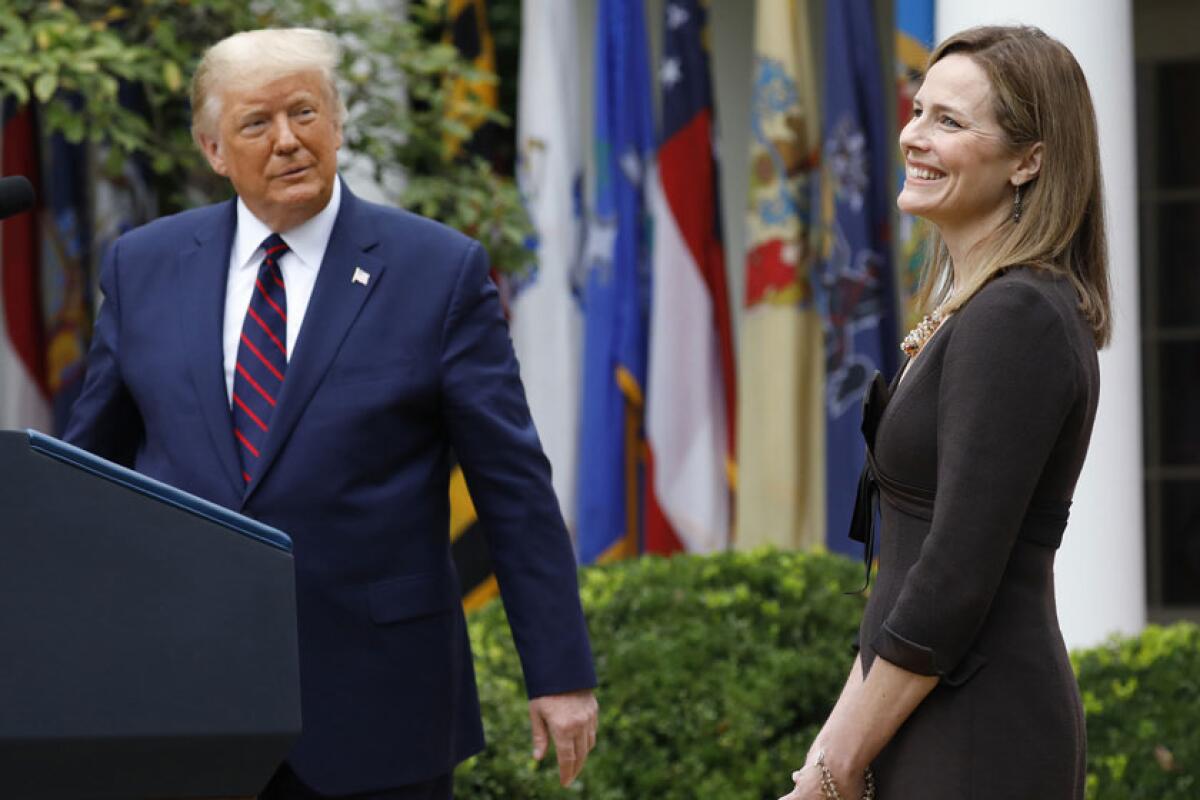How the Senate should question Amy Coney Barrett to show the threat she poses

- Share via
The confirmation hearings for Amy Coney Barrett, which begin on Monday, have a near certain outcome. With 53 Republican senators, and all but two having said that they would vote on her nomination before the election, there is nothing the Democrats can do to block her from becoming a Supreme Court justice.
And the hearings could be unenlightening. Barrett knows from those who have gone before her in front of the Senate Judiciary Committee that dodging questions has no consequences. Barrett is sure to reiterate often that she will be neutral and impartial, just an umpire calling balls and strikes, and politely decline to respond to any inquiry that would reveal her beliefs about issues likely to come before the Court.
So, what tack should the senators who oppose her appointment take during the hearing? Their questions should focus on three areas, aiming to expose the danger Barrett’s far-right conservatism poses to treasured rights Americans have embraced as settled law.
The questioners should refrain from asking Barrett about her Catholic religious beliefs, even though in a law review article she said that Catholic judges must stick to those beliefs on the bench. No one should be appointed or defeated on account of his or her religion.
Instead, the senators should focus on her judicial philosophy. Judge Barrett, like Justice Antonin Scalia before her, has repeatedly described herself as an originalist, saying that the meaning of a constitutional provision is fixed when it is adopted and can be changed only by constitutional amendment. In this view, it is the intention of the framers that matters, and societal shifts over the centuries should never be considered in rendering an opinion.
With that in mind, one line of questioning should be to push Barrett on whether she can identify anyone holding this originalist approach who ever has supported abortion rights or the right of same-sex couples to marry.
Barrett would refuse to answer questions about how she herself might rule on these issues, but it would be useful to get her to acknowledge that judges ascribing to her philosophy would be unlikely to acknowledge either of those rights.
A second line of questioning should focus on how little weight she would give to previous rulings. As a law professor, Barrett wrote that precedent deserves little, if any weight, in constitutional law, noting that, “a justice’s duty is to the Constitution and that it is thus more legitimate for her to enforce her best understanding of the Constitution rather than a precedent she thinks clearly in conflict with it.”
Here’s why that’s dangerous: Over many decades, the Supreme Court has protected many constitutional rights that cannot be justified from an originalist perspective, including the right to marry, the right to procreate, the right to custody of one’s children, the right to control the upbringing of one’s children, the right to purchase and use contraceptives, the right to abortion, the right to engage in private, consensual adult same-sex sexual activity and the right to refuse medical treatment.
There is nothing in Barret’s writings as an academic or a judge that suggest she would not vote to overrule the decisions that recognized these constitutional rights, and senators should press her hard on that point.
A third line of questioning should focus on Barrett’s writings compared to her rulings on the bench. As a law professor, she strongly criticized Supreme Court decisions protecting a woman’s right to abortion, upholding the Patient Protection and Affordable Care Act, and establishing a right of gay and lesbian couples to marry. She now has been a federal court of appeals judge for more than two years. She should be pressed to identify any instance as a judge where she took a position different from what she espoused as an academic.
By pursuing those three lines of questioning, the senators could help reveal the enormous consequences of a Barrett confirmation. She almost certainly would be the fifth vote to overrule Roe v. Wade and end the constitutional right to abortion. She could well be the fifth vote to end constitutional protection for marriage equality for gays and lesbians and to declare the Patient Protection and Affordable Care Act unconstitutional, leaving 21 million people without health insurance. All of these results are opposed by a solid majority of the American people.
As the election approaches, and as the Republicans are rushing the confirmation in an unprecedented manner, Democrats must use the hearings as an opportunity to convey how much President Trump and the Republicans will undermine the rights of all Americans by putting Barrett on the Supreme Court.
Erwin Chemerinsky is dean of the UC Berkeley School of Law and a contributing writer to Opinion.
More to Read
A cure for the common opinion
Get thought-provoking perspectives with our weekly newsletter.
You may occasionally receive promotional content from the Los Angeles Times.









